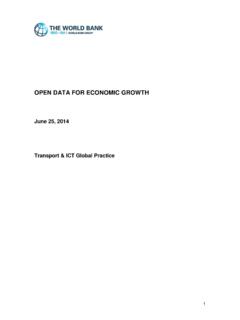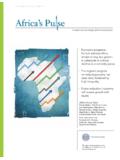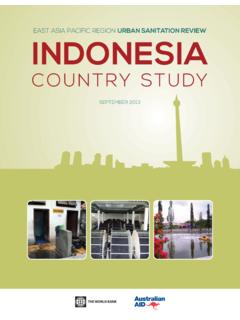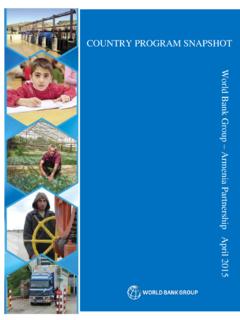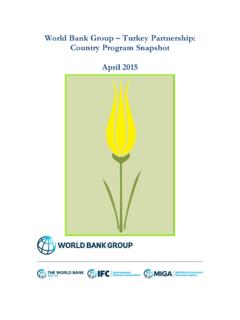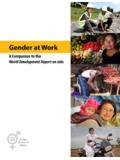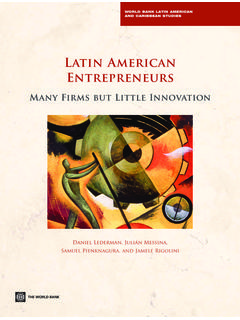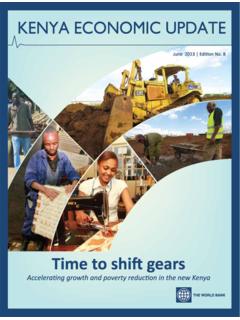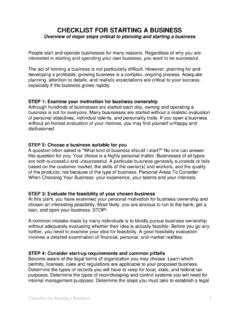Transcription of Doing Business: External Panel Review
1 Doing business : External Panel Review Final Report September 1, 2021 Panel members: Laura Alfaro, Harvard University Alan Auerbach, University of California at Berkeley Mauricio C rdenas (Chair), Columbia University Takatoshi Ito, Columbia University Sebnem Kalemli- zcan, University of Maryland Justin Sandefur, Center for Global Development Seho Kim, Rodrigo Morales Mendoza, and Jenny Ning provided excellent research assistance. We re grateful to Carmen Reinhart, Aart Kraay, and Norman Loayza for helpful discussions, to Rita Ramalho who served as the main World Bank contact for the Panel , and to the entire Doing business team for sharing their time through multiple meetings and detailed feedback on an earlier draft.
2 We are also indebted to a long list of others who took time out to meet with the Panel and/or make written submissions. 2 Table of Contents Table of Contents Summary of recommendations Section 1. Introduction Overview and purpose of Doing business Past reviews and changes to the Doing business index The need for a new Review Section 2. Data Collection Methodology Expanding the case study method to acknowledge firm heterogeneity and the informal sector Moving from de jure to de facto measurement of regulation Measuring an efficient business environment Indicators of limited relevance to SMEs The tension between relevance of methodological changes vs.
3 Comparability across time Rethinking aggregation and ranking Section 3. The Paying Taxes indicator Brief description of the Paying Taxes methodology Dealing with the Race to the Bottom: Should the TTCR indicator be removed or modified? Determining the scope of taxes to be considered Other Issues Section 4. New and expanded topic areas: Proposals from the Doing business team Contracting with the Government Digital business Indicators Revisiting the topic of Employing Workers Section 5. The role of international transactions Widening the scope of Trading across Borders : include tariffs and other costs and regulations International Financial Transactions Incorporating FDI Section 6.
4 Governance of Doing business Three types of threats to the integrity of Doing business Remedial actions 3 Annexes A. Summary of past reviews: recommendations and subsequent World Bank actions B. Summary of meetings and submissions to the Panel C. Doing business 2020: Methodology notes and other site references 4 Summary of recommendations 1. The Doing business project is a unique source of comparable global data, relevant for researchers, businesses, and policymakers, and potentially of great value to inform decisions by governments and firms.
5 However, to unleash that potential the current methodology should be significantly modified, implying a major overhaul of the project. With that goal, this Review makes a number of recommendations that seek to improve the methodology behind the data, fill important gaps in its substantive coverage, clarify what can and cannot be said on the basis of the data, and protect the integrity of the data collection process. Importantly, our recommendations should be considered as a package in order to ensure a meaningful continuation of the Doing business project.
6 A piecemeal approach would not produce the desired outcome. 2. Measure the de facto reality, not just de jure rules, facing a representative cross-section of firms. A long-standing concern with Doing business shared by many stakeholders is that the focus on de jure regulation fails to capture the de facto reality of many businesses. The exclusive use of hypothetical case studies also fails to capture the diversity of firms and sectors within countries, and obscures critical cross-country differences. We recommend a substantial methodological shift in favor of more data collection from representative samples of actual business owners and operators on their de facto experiences of Doing business .
7 3. Include indicators measuring the positive functions of government in promoting a good business environment. In addition to regulating business activity, governments provide essential public goods to the private sector: transport and communications infrastructure, a skilled workforce, law and order, etc. Doing business ignores most of these functions. We recommend remedying this omission. 5 4. Expand coverage of international business issues. Currently, most indicators that are part of Doing business focus exclusively on a hypothetical domestically-owned enterprise, very partially engaged in international trade.
8 This omits an essential dimension of private investment decisions, making the Doing business out of sync with what many readers seek from it. We recommend various ways to expand the international coverage of the indicators. 5. Remove the aggregate index and country rankings. Doing business covers a diverse array of indicators that often have little meaning when aggregated with arbitrary weights. Furthermore, the underlying survey of experts measures laws and policies; it does not evaluate them. For some indicators, less is clearly better ( , delays in registering a business ), while for others, optimal policy is far less clear ( , the optimal corporate tax rate).
9 Publishing the indicators to enable further analysis elevates the level of global policy dialog; aggregating them and ranking countries lowers it, and invites the type of External interference and conflicts of interest witnessed in recent years. 6. Retain and improve the measurement of "Paying Taxes," including the Total Tax Contribution Rate (TTCR) , but do not rank countries on their tax rates. The tax indicator, and in particular the Total Tax Contribution Rate has come under heavy criticism. From a societal standpoint, collecting taxes is necessary, and thus lower tax rates are not necessarily better.
10 Nevertheless, taxes impose costs on firms and are a central concern of any business . Therefore, we believe it's valuable for Doing business to collect and report comparable data on tax systems, including tax rates. To improve this indicator, a comprehensive set of taxes should be considered, and the information should be presented in a transparent way without ad hoc adjustments or manipulation to reflect goals and preferences. However, it is equally important to capture better the benefits of taxation through expanded measures of public services that enable an efficient business environment (recommendation 3).
